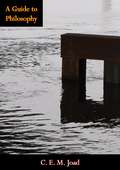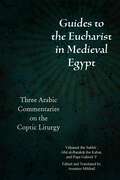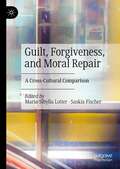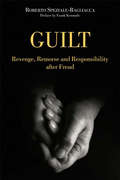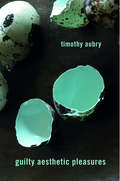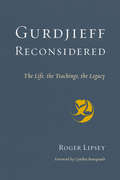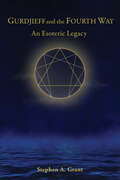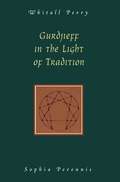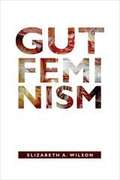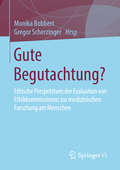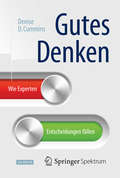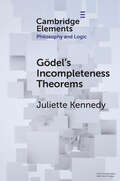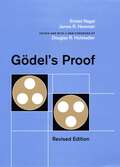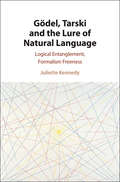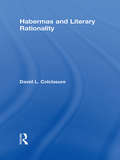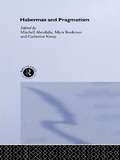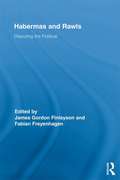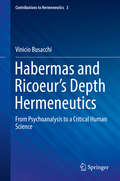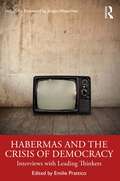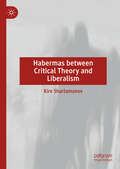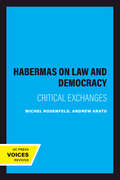- Table View
- List View
Guide to Philosophy
by C. E. M. JoadJoad's 'Guide to Philosophy' examines systematically but non-technically the central questions of philosophical thought since classical times—Is there a plan to the universe? Is mind unique and independent or a mere secretion of the brain? Is there such a thing as free will? These and similar questions in the theory of knowledge and in metaphysics are introduced, the reasons why they are so much discussed are shown, and the methods by which the discussions have been pursued through the centuries are illustrated. The examination is, for the most part, in terms of opposed solutions- subjective idealism vs. realism, teleology vs. chance, causation vs. temporalism, logical positivism vs. vitalism and modern idealism. Under each problem area, the contributions of each of the major philosophers—Plato, Aristotle, the Scholastics, Kant, Hegel, Leibnitz, William James, and many others—are considered, with such milestones as Plato's theory of ideas, Aristotle's criticism, Kant's and Hegel's philosophical systems, Bergson's philosophy, and Whitehead's philosophy each receiving a chapter or more.
Guides to the Eucharist in Medieval Egypt: Three Arabic Commentaries on the Coptic Liturgy (Christian Arabic Texts in Translation)
by Yūḥannā ibn Sabbā‘ Abū al-Barakāt ibn Kabar Pope Gabriel V of AlexandriaThe fourteenth and fifteenth centuries witnessed a rising interest in Arabic texts describing and explaining the rituals of the Coptic Church of Egypt. This book provides readers with an English translation of excerpts from three key texts on the Coptic liturgy by Abū al-Barakāt ibn Kabar, Yūh.annā ibn Sabbā‘, and Pope Gabriel V. With a scholarly introduction to the works, their authors, and the Coptic liturgy, as well as a detailed explanatory apparatus, this volume provides a useful and needed introduction to the worship tradition of Egypt’s Coptic Christians. Presented for the first time in English, these texts provide valuable points of comparison to other liturgical commentaries produced elsewhere in the medieval Christian world.
Guilt, Forgiveness, and Moral Repair: A Cross-Cultural Comparison
by Maria-Sibylla Lotter Saskia FischerIn current debates about coming to terms with individual and collective wrongdoing, the concept of forgiveness has played an important but controversial role. For a long time, the idea was widespread that a forgiving attitude — overcoming feelings of resentment and the desire for revenge — was always virtuous. Recently, however, this idea has been questioned. The contributors to this volume do not take sides for or against forgiveness but rather examine its meaning and function against the backdrop of a more complex understanding of moral repair in a variety of social, circumstantial, and cultural contexts. The book aims to gain a differentiated understanding of the European traditions regarding forgiveness, revenge, and moral repair that have shaped our moral intuitions today whilst also examining examples from other cultural contexts (Asia and Africa, in particular) to explore how different cultural traditions deal with the need for moral repair after wrongdoing.
Guilt: Revenge, Remorse and Responsibility After Freud
by Roberto Speziale-BagliaccaGuilt is an original, closely argued examination of the opposition between guilty man and tragic man. Starting from the scientific and speculative writings of Freud and the major pioneers of psychoanalysis to whom we owe the first studies of this complex question, Roberto Speziale-Bagliacca goes on to focus on the debate between Klein and Winnicott in an enlightened attempt to remove blame and the sense of guilt from religion, morality and law. Drawing on an impressive range of sources - literary, historical and philosophical - and illustrated by studies of composers, thinkers and writers as diverse as Mozart and Chuang Tzu, Shakespeare and Woody Allen, Guilt covers a range of topics including the concept of guilt used within the law, and the analyst's contribution to the client's sense of guilt. Previously unavailable in English, this book deserves to be read not only by psychoanalysts, philosophers. scholars and forensic psychiatrists interested in the theory of justice, but also be the ordinary educated reader.
Guilty Aesthetic Pleasures
by Timothy AubryFor scholars invested in supporting or challenging dominant ideologies, the beauty of literature seemed frivolous, even complicit with social iniquities. Suspicion of aesthetics became a way to establish the rigor of one’s thought and the purity of one’s politics. Yet aesthetic pleasure never disappeared, Timothy Aubrey writes. It went underground.
Gurdjieff Reconsidered: The Life, the Teachings, the Legacy
by Cynthia Bourgeault Roger LipseyFrom a master biographer and longtime Gurdjieff practitioner, a brilliant new exploration of the quintessential Western esoteric teacher of the twentieth-century.The Greek-Armenian teacher G.I. Gurdjieff was one of the most original and provocative spiritual teachers in the twentieth-century West. Whereas much work on Gurdjieff has been either fawning or blindly critical, acclaimed scholar and writer Lipsey balances sympathetic interest in Gurdjieff and his "Fourth Way" teachings with a historian's sense of context and a biographer's feel for personality and relationships. Using a wide range of published and unpublished sources, Lipsey explores Gurdjieff's formative travels in Central Asia, his famed teaching institution in France, the development of the Gurdjieff Movements and music, and, above all, Gurdjieff's fascinating continuous evolution as a teacher. Published on the 70th anniversary of Gurdjieff's death, Gurdjieff Reconsidered delves deeply into Gurdjieff's writings and those of his most important students, including P. D. Ouspensky and Jeanne de Salzmann. Lipsey's comprehensive approach and unerring sense of the subject make this a must-read for anyone with a serious intention to explore Gurdjieff's life, teachings, and reputation.
Gurdjieff and the Fourth Way: An Esoteric Legacy
by Stephen A. GrantA profound new look at Gurdjieff&’s life, teaching, and role as a spiritual leader through the lens of esotericism.Gurdjieff warned against taking anything literally or on faith, and he advised accepting only experience that could be lived oneself. He also said that one has to find out &“how to know&” and that understanding higher knowledge depends on one&’s &“level of being.&” The aim of the Fourth Way is toward a change of being—from the level of man number one, two, and three to that of man number four. Stephen Grant offers a fundamental reassessment of Gurdjieff as a spiritual leader and the Fourth Way as an esoteric teaching. This includes recognizing the Fourth Way as esoteric Buddhism.This book outlines Gurdjieff&’s early life and view of ancient history, followed by the itinerant course of his teaching from Russia in 1915 to his death in Paris in 1949. The discussion then focuses on his esoteric mission—to bring the Fourth Way to the West—and its three major stages: (1) introducing the system of ideas to and through P. D. Ouspensky; (2) writing his own theory of the teaching, principally in Beelzebub&’s Tales; and (3) passing on the practical teaching to and through Jeanne de Salzmann. The last five chapters deal with Gurdjieff&’s relationship with his closest pupils, his system of ideas, his hidden doctrine in Beelzebub&’s Tales, and the practical knowledge revealed by Mme. de Salzmann.
Gurdjieff in the Light of Tradition
by Whitall PerryProbably no figure of our time has excited at once more enthusiasm and controversy among serious intellectuals seeking spiritual guidance than Georgi ivanovitch Gurdjieff. According, the editor of Studies in Comparative Religion engaged Whitall N. Perry, who as author of A Treausry of Traditional Wisdom is recognized for his impartiality, to devote a series of articles that world pierce through the obscurity and get to the real facts of the master. Thisbook is the result of that research. Whatever be the opinion of Gurdjieff gained by the reader, one thing certain is that he or she will come away with a far clearer understanding of the background, teaching, and phenomenon perse than has ever been accessible before.
Gut Anthro: An Experiment in Thinking with Microbes
by Amber BenezraA fascinating ethnography of microbes that opens up new spaces for anthropological inquiry The trillions of microbes in and on our bodies are determined by not only biology but also our social connections. Gut Anthro tells the fascinating story of how a sociocultural anthropologist developed a collaborative &“anthropology of microbes&” with a human microbial ecologist to address global health crises across disciplines. It asks: what would it mean for anthropology to act with science? Based partly at a preeminent U.S. lab studying the human microbiome, the Center for Genome Sciences at Washington University, and partly at a field site in Bangladesh studying infant malnutrition, it examines how microbes travel between human guts in the &“field&” and in microbiome laboratories, influencing definitions of health and disease, and how the microbiome can change our views on evolution, agency, and life.As lab scientists studied the interrelationships between gut microbes and malnutrition in resource-poor countries, Amber Benezra explored ways to reconcile the scale and speed differences between the lab, the intimate biosocial practices of Bangladeshi mothers and their children, and the looming structural violence of poverty. In vital ways, Gut Anthro is about what it means to collaborate—with mothers, local field researchers in Bangladesh, massive philanthropic global health organizations, with the microbiome scientists, and, of course, with microbes. It follows microbes through various enactments in scientific research—microbes as kin, as data, and as race. Revealing how racial categories are used in microbiome research, Benezra argues that microbial differences need transdisciplinary collaboration to address racial health disparities without reifying race as a straightforward biological or social designation.Gut Anthro is a tour de force of science studies and medical anthropology as well as an intensely personal and deeply theoretical accounting of what it means to do anthropology today. Cover alt text:Black background overlaid with a pink organic path suggestive of a human digestive system. Title appears within the guts as if being processed.
Gut Feminism
by Elizabeth A. WilsonIn Gut Feminism Elizabeth A. Wilson urges feminists to rethink their resistance to biological and pharmaceutical data. Turning her attention to the gut and depression, she asks what conceptual and methodological innovations become possible when feminist theory isn't so instinctively antibiological. She examines research on anti-depressants, placebos, transference, phantasy, eating disorders and suicidality with two goals in mind: to show how pharmaceutical data can be useful for feminist theory, and to address the necessary role of aggression in feminist politics. Gut Feminism's provocative challenge to feminist theory is that it would be more powerful if it could attend to biological data and tolerate its own capacity for harm.
Gute Begutachtung?: Ethische Perspektiven der Evaluation von Ethikkommissionen zur medizinischen Forschung am Menschen
by Monika Bobbert Gregor ScherzingerDie Unverzichtbarkeit der Beratung bzw. Prüfung einer medizinischen Studie durch eine Ethikkommission ist weithin anerkannt. Dennoch sind Forschungsethikkommissionen immer wieder der Kritik, z.B. nach mehr Effizienz, Transparenz oder Konsistenz ausgesetzt. Evaluationsinstrumente für Ethikkommissionen beinhalten oft implizite Vorstellungen „guter“ Qualität. Aus ethischer Sicht sind vor allem der Schutz der Versuchsperson und eine vertretbare Schaden-Nutzen-Bewertung wichtig. Der interdisziplinäre Sammelband geht der Frage auf den Grund, wie sich eine Qualitätsverbesserung aus ethischer Sicht gewährleisten und umsetzen lässt. Der Inhalt· Ethikkommissionen im rechtlichen und ethischen Diskurs· Rechtliche Rahmenbedingungen von Ethikkommissionen in der Schweiz und organisatorische und prozedurale Qualitätskriterien· Forschungs-Ethikkommissionen in der Schweiz: Qualitätsbewertung aus ethischer Sicht· Ethikkommissionen als Patientenschutzkommissionen· Die ethische Aufgabe von Ethikkommissionen angesichts normativer Divergenz von Therapie und Forschung· Ethische Theorien und die Bewertung von Forschungsvorhaben· Kriterien für die ethische Qualität des Begutachtungsprozesses· Schutz der Versuchsperson: Forderungen aus ethischer Sicht zur Struktur-, Prozess- und ErgebnisqualitätDie HerausgeberProf. Dr. Monika Bobbert lehrt und forscht zur Moraltheologie und Medizinethik an der Universität Münster.Dr. Gregor Scherzinger ist wissenschaftlicher Mitarbeiter am Institut für Sozialethik der Universität Luzern.
Gutes Denken: Wie Experten Entscheidungen fällen
by Denise D. CumminsEine Expedition durch die Landschaft des kritischen Denkens Was ist kluges Denken? Wann bezeichnen Psychologen eine Idee als „kreative Einsicht“? Was verstehen Ökonomen unter einem „rationalen Agenten“? Mit welchen logischen Argumenten untermauern Philosophen ihre Forderung, „moralischen Imperativen“ zu gehorchen? Wenn Experten Entscheidungen fällen, folgen sie dabei gewöhnlich einigen wichtigen, aber bisweilen kontraintuitiven Konzepten. Sie nutzen spezifische Analysetechniken und Denkmethoden, um bestimmte Sachverhalte zu beurteilen, etwa wenn es zu ermitteln gilt, ob jemand schuldig oder unschuldig ist, welche Geldanlage die sicherste ist oder welches Medikament eine Krankheit am wirksamsten bekämpft. Gutes Denken erkundet die Wege, die Fachleute verschiedener Disziplinen beschreiten, um Probleme zu lösen, die unmittelbare Auswirkungen auf unser tägliches Leben haben. Die Lektüre dieses Buches bringt Ihnen die sieben wichtigsten Konzepte nahe und liefert Ihnen so das Rüstzeug, um selbst klarer zu denken, überzeugender zu argumentieren und klüger zu entscheiden. Cummins bietet einen geistreichen und klar gegliederten Überblick über die entscheidenden Aspekte menschlicher Denkprozesse…. Die klug gewählten Beispiele verankern die Themen unmittelbar in der Alltagserfahrung der Leser.“ Richard Gerrig, Psychologie-Professor an der Stony Brook University und Co-Autor des weltweit bewährten Lehrbuches „Psychologie“ Die sieben Schlüsselkonzepte des Denkens Wenn Sie dieses Buch gelesen haben, werden Sie in zweierlei Hinsicht weiser sein. Sie werden wissen, wie die besten und klügsten Denker entscheiden, argumentieren, Probleme lösen und richtig von falsch unterscheiden. Aber Ihnen wird auch bewusst sein, dass es durchaus nicht immer schlecht ist, wenn man diese Standards nicht erfüllt. Denise D. Cummins stellt Ihnen die sieben entscheidenden Denkkonzepte vor, die die Welt verändert haben: Denken lässt sich automatisieren, daher können wir Maschinen bauen, die denken.Um Probleme zu lösen, sollten Sie immer Wege suchen, die den Abstand zwischen Ihrer aktuellen Situation und Ihrer Zielsituation verringern. Einsicht ist quasi eine implizite Suche.Einige Gedanken führen zu weitergehenden Überlegungen, andere tun das nicht, und es gibt Regeln, mit denen Sie feststellen können, welche zur ersten Gruppe gehören und welche zur zweiten.Um herauszufinden, was wahr ist, sollten Sie am besten zuerst herausfinden, was falsch ist.Um zu entscheiden, welche Ursache etwas hat, ist es nötig, Alternativen zu bedenken. Sie werden nicht immer bekommen, was Sie möchten, aber Sie können herausfinden, was Ihnen am ehesten dazu verhelfen wird.Das Spiel ändert sich, wenn Sie es nicht allein spielen.[Cummins] diskutiert, wie Ökonomen, Philosophen und andere Fachleute definiert haben, was eine Entscheidung rational oder ein Urteil moralisch macht. Sie legt die sieben Grundsätze des kritischen Denkens dar und erkundet die Taktiken, mit denen sich fehlerhafte Logik korrigieren lässt. Scientific American.
Gyanyog: ज्ञानयोग
by Swami Vivekanandaस्वामी विवेकानन्द के ज्ञानयोग सम्बन्धित व्याख्यान, उपदेशों तथा लेखों को लिपिबद्ध कर 'ज्ञानयोग' पुस्तक में संकलित किया है। स्वामी विवेकानन्द द्वारा वेदान्त पर दिये गये भाषाणों का संग्रह ‘ज्ञानयोग’ है। इन व्याख्यानों में श्री स्वामीजी ने वेदान्त के गूढ़ तत्त्वों की ऐसे सरल, स्पष्ट तथा सुन्दर रूप से विवेचना की है कि आजकल के शिक्षित जनसमुदाय को ये खूब जँच जाते हैं। उन्होंने यह दर्शाया है कि वैयक्तिक तथा सामुदायिक जीवन-गठन में वेदान्त किस प्रकार सहायक होता है। मनुष्य के विचारों का उच्चतम स्तर वेदान्त है और इसी की ओर संसार की समस्त विचारधाराएँ शनैःशनैः प्रवाहित हो रही हैं। अन्त में वे सब वेदान्त में ही लीन होंगी। स्वामीजी ने यह भी दर्शाया है कि मनुष्य के दैवी स्वरूप पर वेदान्त कितना ज़ोर देता है और किस प्रकार इसी में समस्त विश्व की आशा, कल्याण एवं शान्ति निहित है और हमें पूर्ण विश्वास है कि वेदान्त तथा भारतीय संस्कृति के प्रेमियों को इस पुस्तक से विशेष लाभ होगा।
Gödel's Incompleteness Theorems (Elements in Philosophy and Logic)
by Juliette KennedyThis Element takes a deep dive into Gödel's 1931 paper giving the first presentation of the Incompleteness Theorems, opening up completely passages in it that might possibly puzzle the student, such as the mysterious footnote 48a. It considers the main ingredients of Gödel's proof: arithmetization, strong representability, and the Fixed Point Theorem in a layered fashion, returning to their various aspects: semantic, syntactic, computational, philosophical and mathematical, as the topic arises. It samples some of the most important proofs of the Incompleteness Theorems, e.g. due to Kuratowski, Smullyan and Robinson, as well as newer proofs, also of other independent statements, due to H. Friedman, Weiermann and Paris-Harrington. It examines the question whether the incompleteness of e.g. Peano Arithmetic gives immediately the undecidability of the Entscheidungsproblem, as Kripke has recently argued. It considers set-theoretical incompleteness, and finally considers some of the philosophical consequences considered in the literature.
Gödel's Proof
by Douglas R. Hofstadter Ernest Nagel James R NewmanAn accessible explanation of Kurt Gödel&’s groundbreaking work in mathematical logic: &“An excellent nontechnical account.&” —Bulletin of the American Mathematical Society In 1931 Kurt Gödel published his fundamental paper, &“On Formally Undecidable Propositions of Principia Mathematica and Related Systems.&” This revolutionary paper challenged certain basic assumptions underlying much research in mathematics and logic. Gödel received public recognition of his work in 1951 when he received the first Albert Einstein Award for achievement in the natural sciences—perhaps the highest award of its kind in the United States. The award committee described his work in mathematical logic as &“one of the greatest contributions to the sciences in recent times.&” However, few mathematicians of the time were equipped to understand the young scholar&’s complex proof. Ernest Nagel and James Newman provide a readable and accessible explanation to both scholars and non-specialists of the main ideas and broad implications of Gödel's discovery. It offers every educated person with a taste for logic and philosophy the chance to understand a previously difficult and inaccessible subject. New York University Press is proud to publish this special edition of one of its bestselling books. With a new foreword by Douglas R. Hofstadter, Pulitzer Prize-winning author of Gödel, Escher, Bach, who also updated the text, this book will be of interest to students, scholars, and professionals in the fields of mathematics, computer science, logic and philosophy, and science.
Gödel, Tarski and the Lure of Natural Language: Logical Entanglement, Formalism Freeness
by Juliette KennedyIs mathematics 'entangled' with its various formalisations? Or are the central concepts of mathematics largely insensitive to formalisation, or 'formalism free'? What is the semantic point of view and how is it implemented in foundational practice? Does a given semantic framework always have an implicit syntax? Inspired by what she calls the 'natural language moves' of Gödel and Tarski, Juliette Kennedy considers what roles the concepts of 'entanglement' and 'formalism freeness' play in a range of logical settings, from computability and set theory to model theory and second order logic, to logicality, developing an entirely original philosophy of mathematics along the way. The treatment is historically, logically and set-theoretically rich, and topics such as naturalism and foundations receive their due, but now with a new twist.
Habermas
by Stephen K. WhiteThis volume examines the historical and intellectual contexts out of which Habermas' work emerged, and offers an overview of his main ideas, including those in his most recent publication. Among the topics discussed are: his relationship to Marx and the Frankfurt School of critical theory, his unique contributions to the philosophy of social sciences, the concept of "communicative ethics," and the critique of postmodernism. Particular attention is paid to Habermas' recent work on democratic theory and the constitutional state.
Habermas and Literary Rationality (Routledge Studies In Contemporary Philosophy Ser. #20)
by David L. ColclasureLiterary scholarship has paid little serious attention to Habermas' philosophy, and, on the other hand, the reception of Habermas has given little attention to the role that literary practice can play in a broader theory of communicative action. David Colclasure's argument sets out to demonstrate that a specific, literary form of rationality inheres in literary practice and the public reception of literary works which provides a unique contribution to the political public sphere.
Habermas and Pragmatism
by Mitchell Aboulafia Myra Bookman Catherine KempThere are few living thinkers who have enjoyed the eminence and reown of Jürgen Hamermas. His work has been highly influential not only in philosopy, but also in the fields of politics, sociology and law. This is the first collection dedicated to exploring the connections between his body of work ahd America's most significant philosophical movement, pragmatism. Habermas and Pragmatism considers the influence of pragmatism on Habermas's thought and the tensions between Habermasian social theory and pragmatism. Essays by distinguished pragmatists, legal and critical theorists, and Habermas cover a range of subjects including the philosophy of language, the nature of rationality, democracy, objectivity, transcendentalism, aesthetics, and law. The collection also addresses the relationship to Habermas of Kant, Peirce, Mead, Dewey, Piaget, Apel, Brandom and Rorty.
Habermas and Rawls: Disputing the Political (Routledge Studies in Contemporary Philosophy #23)
by James Gordon Finlayson Fabian FreyenhagenHabermas and Rawls are two heavyweights of social and political philosophy, and they are undoubtedly the two most written about (and widely read) authors in this field. However, there has not been much informed and interesting work on the points of intersection between their projects, partly because their work comes from different traditions—roughly the European tradition of social and political theory and the Anglo-American analytic tradition of political philosophy. In this volume, contributors re-examine the Habermas-Rawls dispute with an eye toward the ways in which the dispute can cast light on current controversies about political philosophy more broadly. Moreover, the volume will cover a number of other salient issues on which Habermas and Rawls have interesting and divergent views, such as the political role of religion and international justice.
Habermas and Ricoeur's Depth Hermeneutics
by Vinicio BusacchiThis book presents a critical and systematic study of the possibility to consider and practice Freud's psychoanalysis as a form of depth hermeneutics. It contributes to a screening of the possibility of a hermeneutical interpretation of psychoanalysis, particularly with respect to the therapeutic practice. The book is an investigation into the philosophical implications of the hermeneutical re-reading of psychoanalysis and clarifies the real speculative and theoretical potential behind the dialectic of hermeneutics and psychoanalysis. It examines two themes which, so far, have remained unclarified and unexplored in their potentiality: firstly, at the level of a construction of a procedural model for the human and social sciences, as well as for philosophy, and, secondly, at the level of a philosophy of the human being able to subsume and express the biological and natural dimension of human identity as well as its historical narrative and social identity.
Habermas and Theology
by Nicholas AdamsHow can the world's religious traditions debate within the public sphereï 1/2 In this book Nicholas Adams shows the importance of Habermas' approaches to this question. The full range of Habermas' work is considered, with detailed commentary on the more difficult texts. Adams energetically rebuts some of Habermas' arguments, particularly those which postulate the irrationality or stability of religious thought. Members of different religious traditions need to understand their own ethical positions as part of a process of development involving ongoing disagreements, rather than a stable unchanging morality. Public debate additionally requires learning each other's patterns of disagreement. Adams argues that rather than suspending their deep reasoning to facilitate debate, as Habermas suggests, religious traditions must make their reasoning public, and that 'scriptural reasoning' is a possible model for this. Habermas overestimates the stability of religious traditions. This book offers a more realistic assessment of the difficulties and opportunities they face.
Habermas and the Crisis of Democracy: Interviews with Leading Thinkers
by Emilie Prattico"Emilie Prattico has used the lens of a discourse-theoretic conception of deliberative democracy to engage eight prominent colleagues in stimulating interviews. They critically illuminate the various ways that a sound democratic regime depends upon the deliberative milieu of an inclusive public sphere." - Jürgen Habermas The continued rise of populism and authoritarianism throughout the world has witnessed an alarming attack on basic democratic freedoms and led to a divided political and social world. Few thinkers have done as much as Jürgen Habermas to understand and critique these problems, perhaps most famously through his notions of the public sphere, deliberative democracy, and discourse ethics. In this fascinating book, Emilie Prattico considers the crisis of democracy from a Habermasian standpoint via engaging interviews with an outstanding lineup of leading philosophers and thinkers. The following key topics are unpacked and explored: Can some basic rights and liberties be given up to safeguard democracy? With Hauke Brunkhorst How does actual deliberation confer legitimacy to democratic decisions? With Cristina Lafont Why is "fake news" a crisis of democracy? With Michael Lynch How can we build a public sphere together and share it in a world characterized by divisiveness and tribalism? With Barbara Fultner Can democracy survive without the voice of experts? With Kenneth Baynes How dangerous are the current forms of authoritarianism we are seeing take hold all over the world? With María Pía Lara What does the public sphere look like with new technologies? With Gertrud Koch What duties do we owe descendants of slaves and how do we reckon with our antidemocratic and oppressive past? With Lorenzo Simpson Also including a Foreword by Habermas himself, this book is essential reading for anyone seeking to understand the challenges facing democracy and liberalism today. It will be of great interest to those in philosophy, sociology, and politics as well as related fields such as religion and law.
Habermas between Critical Theory and Liberalism
by Kire SharlamanovThis book identifies the turning points in Habermas's work and his transition from one stage to another in the development of his theoretical oeuvre. Habermas began his academic career as part of the Frankfurt School, but the two key points at which his career changes trajectory are moving from historical materialism to normative idealism and playing with some of the ideas of liberalism. Normative idealism is an ahistorical theory that insists on the independence of the normative from material reality, severing the connection between base and superstructure that Marx wrote about. The break with the basic concepts of Marxism enabled Habermas to build his own discursive (critical) theory, which, especially since the end of the 1980s, takes the ideas of liberalism seriously. This book makes a systematic, multidimensional and detailed analysis of Habermas's theoretical oeuvre in two dimensions, chronological (in the order in which Habermas worked on certain topics) and thematic (enclosingcertain thematic units).
Habermas on Law and Democracy: Critical Exchanges (Philosophy, Social Theory, and the Rule of Law #6)
by Michel Rosenfeld Andrew AratoIn the first essay, Habermas himself succinctly presents the centerpiece of his theory: his proceduralist paradigm of law. The following essays comprise elaborations, criticisms, and further explorations by others of the most salient issues addressed in his theory. The distinguished group of contributors—internationally prominent scholars in the fields of law, philosophy, and social theory—includes many who have been closely identified with Habermas as well as some of his best-known critics. The final essay is a thorough and lengthy reply by Habermas, which not only engages the most important arguments raised in the preceding essays but also further elaborates and refines some of his own key contributions in Between Facts and Norms. This volume will be essential reading for philosophers, legal scholars, and political and social theorists concerned with understanding the work of one of the leading philosophers of our age.These provocative, in-depth debates between Jürgen Habermas and a wide range of his critics relate to the philosopher's contribution to legal and democratic theory in his recently published Between Facts and Norms. Drawing upon his discourse theory, Habermas has elaborated a novel and powerful account of law that purports to bridge the gap between democracy and rights, by conceiving law to be at once self-imposed and binding.
